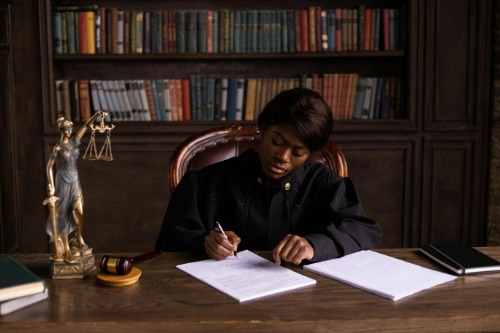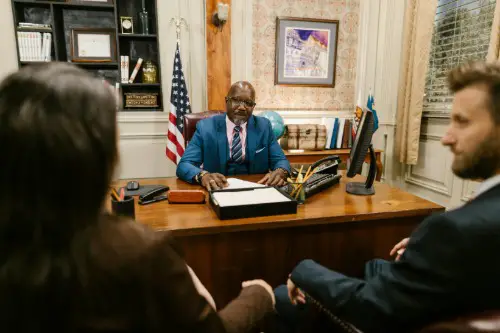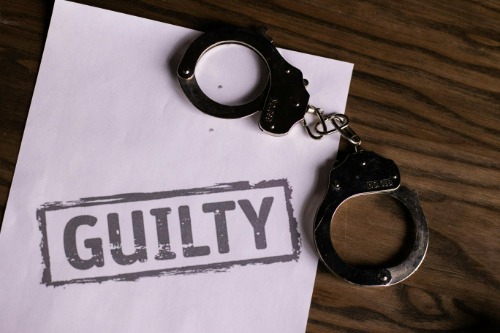1. “Caught red-handed”

This phrase sounds dramatic, and that’s because it used to be—literally. “Caught red-handed” originally referred to someone apprehended with blood on their hands after committing a violent crime, particularly in old Scottish legal texts, according to Laurie L. Dove from HowStuffWorks. It made its way into early American courtrooms, where being “caught red-handed” meant you were found in the act, with physical evidence tying you to the crime. It was used to signify guilt that was obvious and irrefutable.
Today, we use it more playfully—like when a kid is sneaking cookies before dinner—but the phrase’s roots are anything but innocent. It speaks to a time when guilt was proven by direct, often gruesome, evidence. The courtroom usage gave it the weight it needed to become part of everyday language. So, next time you bust someone “red-handed,” just know you’re quoting centuries of legal tradition.
2. “Plead the Fifth”

This one’s about as courtroom as it gets. “Plead the Fifth” comes straight from the Fifth Amendment of the U.S. Constitution, which protects individuals from being forced to incriminate themselves, according to Ariana DiValentino from Business Insider. In legal settings, it’s used when a witness or defendant refuses to answer a question that could make them look guilty. The phrase was born out of real courtroom drama and constitutional rights.
Outside of court, people often toss it around to dodge awkward questions—usually as a joke. But in its original context, it’s a powerful shield against overreach and coercion. The phrase caught on beyond legal circles because it captures the right to stay silent in a way that’s sharp and memorable. Its legal origin gives it that undeniable air of authority, even when someone says it at a party.
3. “On the docket”

This one sounds official because it is, according to the Merriam-Webster dictionary. A “docket” is the official schedule of cases to be heard in court, listing what’s coming up and when. In early American legal systems, having your case “on the docket” meant it was formally recognized and would be heard by a judge. It was the paperwork backbone of courtroom scheduling.
Now we use it for everything from meetings to dinner plans—“What’s on the docket today?” It adds a touch of order and formality to even the most casual of to-do lists. The phrase stuck around because it’s short, catchy, and gives even the mundane a sense of structure. But its roots are firmly planted in the organized chaos of court calendars.
4. “Overruled”

“Overruled” was—and still is—a word you’d hear regularly in a courtroom when a judge denies a lawyer’s objection, according to the Collins Dictionary. It’s essentially a judicial “nope,” letting everyone know the court is moving forward despite an interruption. In early American courts, it was used to maintain order and keep the trial flowing smoothly. It’s concise, powerful, and final—exactly what a judge needs in the middle of a heated case.
Outside of court, it’s become a cheeky way to dismiss someone’s protest. Ever hear someone say “Overruled!” in an argument over dinner? That’s courtroom lingo turned everyday sass. It stuck because it carries authority and finality—even when you’re just arguing about where to order takeout.
5. “The whole truth”

This phrase is part of the classic courtroom oath: “Do you swear to tell the truth, the whole truth, and nothing but the truth?” It was a fundamental part of witness testimony, reminding people that leaving things out could be as misleading as outright lying, according to Brendan Koerner from Slate. The phrase became common in American courts during the 18th and 19th centuries as a way to reinforce honesty under oath. It reflects the justice system’s emphasis on full disclosure.
Now, we use it when we’re trying to sound serious—or dramatic. “Tell me the whole truth” isn’t just legalese anymore; it’s become part of emotional confrontations and heart-to-hearts. The phrase caught on because it feels thorough and trustworthy. But it still carries that courtroom gravity, no matter where you hear it.
6. “Under oath”

Being “under oath” means you’ve sworn to tell the truth, and lying after that is considered perjury—a serious offense in any court. The idea dates back centuries, when oaths were made on religious texts or in the name of a higher power. American courtrooms adopted the tradition early on, tying legal honesty to the moral weight of a sworn promise. Once you were under oath, your words carried more legal weight than everyday conversation.
These days, people say they’re “under oath” outside the courtroom to emphasize they’re being 100% honest. It’s often used to make a point—like “I swear, under oath, that was the best burger I’ve ever had.” The phrase has endured because it instantly signals sincerity and seriousness. But its origins in courtroom rituals are what give it lasting power.
7. “Beyond a reasonable doubt”

This phrase defines the gold standard for proving guilt in criminal cases. To convict someone, the jury must be convinced “beyond a reasonable doubt” that the defendant committed the crime. It’s a phrase that has shaped American justice since the 18th century, emphasizing the principle that it’s better to let a guilty person go free than to wrongly convict an innocent one. It’s all about protecting the accused from unjust punishment.
In everyday conversation, people now use it to show extreme certainty. “I’m beyond a reasonable doubt sure that dog ate my sandwich” has nothing to do with court, but the phrase still carries weight. Its seriousness comes from its legal roots, and people use it when they want to sound confident—and maybe a little dramatic. It’s one of those phrases that reminds us how legal ideas seep into regular speech.
8. “In contempt”

Being “in contempt” originally meant showing disrespect for the court—either by defying a judge’s orders or disrupting the proceedings. In early American legal systems, judges had the authority to punish contempt on the spot to preserve courtroom decorum. You could be fined or even jailed for being “in contempt of court.” It was about maintaining the court’s dignity and authority.
Nowadays, people use it to describe general disapproval or disdain—“I’m in contempt of this ridiculous idea” isn’t a legal statement, but the emotion is similar. The phrase stuck around because it’s strong and unmistakably serious. It still carries that aura of judgment and defiance. Whether you’re talking about courtrooms or conversations, “contempt” is a word that packs a punch.
9. “Rest my case”

When a lawyer says “I rest my case,” it means their argument is done—they’ve presented all their evidence and are letting it stand on its own. The phrase is a classic courtroom closer, often used at the end of a dramatic monologue or heated examination. In early American trials, it marked a formal pause, giving the opposing side their turn. It was both strategic and symbolic.
Outside the courtroom, it’s become a mic-drop moment. People say “I rest my case” when they think they’ve proved their point beyond question—sometimes seriously, sometimes sarcastically. The phrase caught on because it adds flair to an argument, no matter the setting. But its roots in courtroom closure are what give it that final, confident ring.
10. “Case closed”

“Case closed” originally came from judges or court clerks marking the end of a legal case, meaning all decisions were made and no further arguments would be heard. In early courts, it signaled that justice had been served (or at least completed) and that it was time to move on. The case was literally closed in the record books. It was the ultimate legal period at the end of a long sentence.
Now, we use it in everyday life to shut down debates or settle scores—“You forgot our anniversary? Case closed.” It’s a phrase that adds authority to casual decisions. Its legal heritage gives it an air of certainty and finality, which is probably why people love using it. Even when we’re being playful, “case closed” carries the confidence of a courtroom decree.
11. “Due process”

This phrase comes straight from the Constitution and guarantees fair treatment through the normal judicial system. In courtrooms, “due process” ensures that legal rights are upheld and that no one is punished without proper legal proceedings. Early American courts leaned heavily on this principle to differentiate the U.S. system from the arbitrary justice many immigrants had fled. It’s about fairness, structure, and protection from abuse.
Today, we hear “due process” in debates far beyond the courtroom—from school suspensions to political scandals. It’s become shorthand for fairness and proper procedure. The phrase stuck because people want to believe in systems that treat everyone equally. Its legal origin is the reason it holds so much moral and rhetorical weight.
12. “Hung jury”

A “hung jury” is a jury that can’t reach a unanimous decision, meaning the case ends without a verdict. It’s a term that’s been around since at least the 18th century and has always represented a failure of consensus in the legal process. In early American courts, a hung jury could mean a mistrial and a costly do-over. It symbolized the limits of legal certainty, even with all the facts on the table.
In regular conversation, we sometimes use it to describe indecision in a group—like “We’re a hung jury on which movie to watch.” The phrase carried over because it paints a vivid picture of gridlock. It reminds people that even structured processes can hit a wall. But make no mistake: the drama of the original courtroom context is what made it stick.
13. “Cross-examination”

This term refers to the part of a trial when the opposing lawyer gets to question a witness, often trying to poke holes in their story. It’s one of the most theatrical parts of courtroom drama and dates back centuries. In American courtrooms, cross-examination has always been key to uncovering the truth—or catching someone in a lie. It’s where many legendary legal moments happen.
Today, people use “cross-examine” in a more casual way, like when someone grills a friend with too many questions. “Why are you cross-examining me?” isn’t about law—it’s about pressure. The phrase stuck because it captures intensity and scrutiny in a way few others do. Its roots in legal sparring are what make it feel so sharp, even outside the courtroom.


